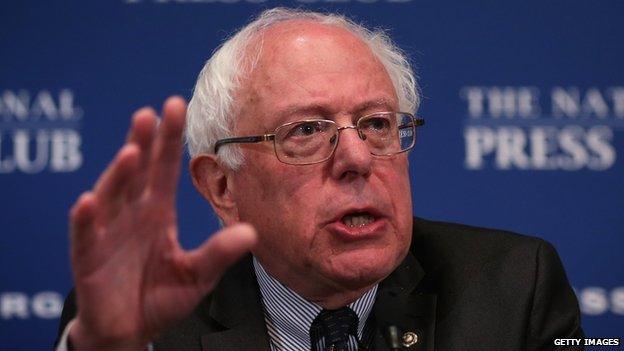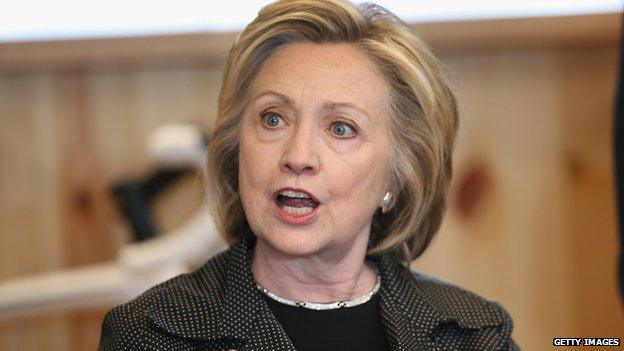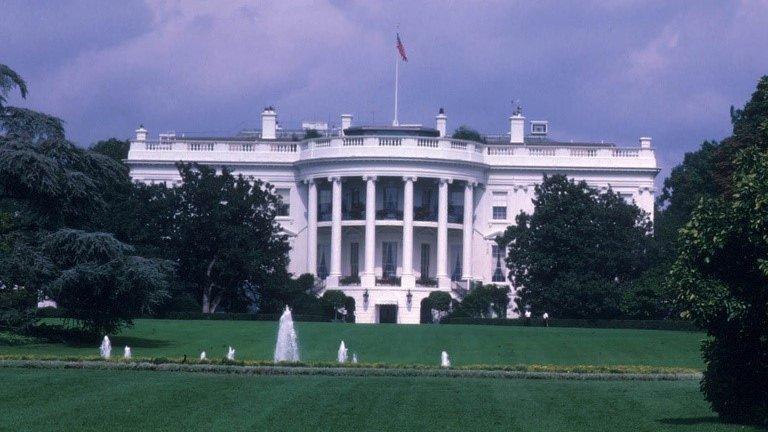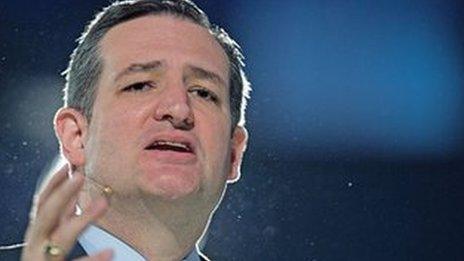The candidate with a plan for 'free' university education
- Published

Vermont Senator Bernie Sanders wants to tax Wall Street to fund a college tuition programme
If Germany, Denmark and Sweden can offer their young people a free university education, Bernie Sanders says, the US can, too.
The Vermont senator, the "democratic socialist" independent who formally announces his campaign for the Democratic presidential nomination on Monday, is making the soaring cost of higher education in the US a key issue in his candidacy.
He's considered the longest of long-shots to beat former Secretary of State Hillary Clinton in the primaries, but by targeting the soaring cost of college tuition he may have found an issue that resonates with the same young voters, external who helped propel Barack Obama to the presidency.
From 2004 to 2014 the inflation adjusted cost of in-state tuition at public universities has increased, external more than 40%.
A four-year university education there now averages $9,139 (£6,000), not including room and board. The price tag for out-of-state enrolees and those attending private colleges is much higher - often exceeding $100,000 for four years.

This, says Mr Sanders, is burdening a generation of Americans with crushing debt, as they finance their educations largely through loans. The average 2015 US university graduate who took out loans to help pay for tuition enters the workforce with $35,000 in student debt. In the US total student debt, external exceeds $1.15 trillion.
"If our economy is to be strong, we need the best educated work force in the world," the senator said, external when he introduced his proposal in Congress earlier in May. "That will not happen if every year hundreds of thousands of bright young people cannot afford to go to college and if millions more leave school deeply in debt."
Mr Sanders envisions a $70bn grant programme, external that would pay four years of tuition for anyone enrolling in a public university. Two-thirds of the cost would be covered by the federal government, while states would be required to fund the other third.
Universities would be prevented from cutting their existing financial aid offerings or using the new funds to pay for administrator salaries or non-academic construction such as sports stadiums or student centres.
The federal portion of the expense, the senator says, would be paid for by a 50 cent tax per $100 of stock sales, as well as smaller fees on other financial transactions.

This year's university graduates who took out loans to pay tuition have an average of $25,000 in student debt
The plan - along with a proposal to reduce interest rates on existing student loans - has been well received by those on the progressive left. They see the Vermont senator's ambitious vision as a refreshing contrast to the moderate calculations of the front-running Mrs Clinton and the more modest free community college proposal by President Barack Obama.
"Vermont Senator Bernie Sanders keeps bending the rules of Senate service and presidential campaigning by offering up proposals that imagine America as the fair, functional and prosperous country it could be," writes, external the Nation's John Nichols. "Instead of playing politics within the narrow lines prescribed by the partisans and pundits who police the political process in America, the recently announced contender for the Democratic presidential nomination is going big."
While the $70bn annual cost of such a programme is large, supporters compare it, external favourably to, for instance, the $2 trillion spent on the Iraq War.
"Every year, we spend nearly $100bn on corporate welfare, and more than $500bn on defence spending," writes, external former Secretary of Labour Robert Reich. "Surely ensuring the next generation can compete in the global economy is at least as important as subsidies for big business and military adventures around the globe."
The plan has plenty of opponents who view it as unrealistic or even counter-productive, however.
"Sanders plan might make US higher education more accessible but less excellent," writes, external Charles Lane in the Washington Post. "Having ruled out price as a means of allocating scarce educational resources, his plan would have to rely on aggressive administrative controls, lest students flood the system and drive up costs - requiring further federal subsidies."
He says that Germany's universities - "considered good, not great" - should be a cautionary tale, not a role model. Making students and their parents pay tuition gives them a reason to demand better results.
"A financial stake encourages students to study hard; it encourages families to monitor their kids' schools and hold them accountable," he concludes. "By contrast, 'free' tuition, regardless of need, may breed entitlement, indifference or both."
Others are more blunt, saying the current system of federally subsidised student loans and government tuition grants are the real culprit. Less, not more, government involvement is the answer.
"Skyrocketing tuition, high default rates, and pathetic graduation rates - to name a few - are all by-products of a system that incentivises inefficiency, largess and misguided decisions," writes, external Aaron Smith for the Mises Institute. "Oddly, while many students aren't legally permitted to take a sip of alcohol, they are systematically encouraged to contract into years of, essentially, indentured servitude."

An aide to Hillary Clinton has endorsed the idea of 'debt-free college'
Mr Sanders' proposal has next to no chance of making any progress in the US Congress. Its Republican majority is currently proposing cuts in education spending rather than increased expenditures.
New taxes at the federal level are also a non-starter, and states - still feeling the pinch of the economic recession - would be hard-pressed to come up with their portion of the cost of the senator's programme.
"Apparently, he is proceeding from the assumption that if you're going to propose something Republicans will never even remotely consider, you may as well dream big," writes, external Wonkette's Dr Zoom. "The programme would eventually give all students their own copy of the complete works of Shakespeare, and a pony."
If Mr Sanders' plan can get the attention - and support - of younger, university-age voters, however, it could push Mrs Clinton to come up with a more ambitious proposal of her own. Already one of Mrs Clinton's campaign aides has endorsed, external the idea of providing "debt-free college".
While the Democratic Party - and its nominee - won't embrace a plan that includes Shakespeare and ponies, or likely even a guaranteed free four-year university education, it could end up moving closer to where Mr Sanders wants it to be on higher education.
- Published16 March 2016

- Published23 March 2015
